- Home
- Kristin Harmel
The Sweetness of Forgetting Page 11
The Sweetness of Forgetting Read online
Page 11
I stare at her. Her face has turned pink, and her eyes are flashing. “Mamie, it’s me,” I say gently. “Hope.”
But she seems not to hear me. “Do not harass me, or I will have you reported,” she says. “Just because I am alone does not mean you can take advantage of me.”
I shake my head, “No, Mamie, I would never—”
She cuts me off. “Now if you will excuse me.” I watch, openmouthed, as she stands with surprising agility and walks quickly toward her bedroom. She slams the door.
I stand up and take a step after her, but then I freeze. I don’t know what to say or do. I feel terrible that I’ve made her upset. The violence of her response confuses me.
After a moment, I follow after her and rap lightly on her door. I can hear her get up from the bed, the springs of her old mattress creaking in protest. She pulls open the door and smiles at me. “Hello, dear,” she says. “I did not hear you come in. Forgive me. I was just reapplying my lipstick.”
Indeed, she has a fresh coat of burgundy on. I stare at her for a moment. “Are you okay?” I ask hesitantly.
“Of course, dear,” she says brightly.
I take a deep breath. She seems to have no recollection of her explosion just moments before. This time I reach for her hands. I need an answer.
“Mamie, look at me,” I say. “I’m your granddaughter, Hope. Remember?”
“Of course I remember. Do not be foolish.”
I hold her hands tightly. “Look, Mamie, I’m not going to hurt you. I love you very much. But I need to know if your family is Jewish.”
Her eyes flash again, but this time, I hold on and make sure she doesn’t look away. “Mamie, it’s me,” I say. I feel her hands tighten around mine. “I’m not trying to hurt you. But I need you to answer me.”
She stares at me for a moment then pulls away. I follow her as she strides back to the window in the living room. I’m just beginning to think that she’s forgotten my question when finally she speaks, in a voice so soft it’s almost a whisper.
“God is everywhere, my dear,” she says. “You cannot define him in any one religion. Do you not know that?”
I put a hand on her back, and I’m heartened when she doesn’t flinch. She’s staring at the oyster sky as the blue seeps into the ground along the horizon.
“No matter what we think of God,” she continues in the same soft, even tone, “we all live under this same sky.”
I hesitate. “The names you gave me, Mamie,” I say softly. “The Picards. Are they your family? Were they taken away during World War Two?”
She doesn’t answer. She continues to stare out the window. After a moment, I try again. “Mamie, was your family Jewish? Are you Jewish?”
“Yes, of course,” she says, and I’m so startled at the immediacy of her reply that I take a step back.
“You are?” I ask.
She nods. Finally, she turns to look at me. “Yes, I am Jewish,” she says. “But I am also Catholic.” She pauses and adds, “And Muslim too.” My heart sinks. For a moment, I’d thought she was speaking with clarity.
“Mamie, what do you mean?” I ask, trying to keep the tremor out of my voice. “You’re not Muslim.”
“It is all the same, is it not? It is mankind that creates the differences. That does not mean it is not all the same God.” She turns to look out the window again. “The star,” she murmurs after a moment, and I follow her gaze to the first pinprick of light against the sunset. I watch with her for a moment, trying to see what she sees, trying to understand what makes her sit at this window every night, searching for something she seems never to find. After a long while, she turns toward me and smiles.
“My daughter Josephine will come to visit one day soon,” she tells me. “You should meet her. You would like her.”
I shake my head and look down at the floor. I decide not to tell her that my mother has long since died. “I’m sure I would,” I murmur.
“I think I will rest,” she says. She looks at me without a glint of recognition. “Thank you for coming. I have enjoyed our visit. I will show you out now.”
“Mamie,” I try.
“No, no,” she says. “My mamie does not live here. She lives in Paris. Near the tower. But I will tell her you say hello.”
I open my mouth to reply, but no words come out. Mamie is herding me toward the door.
I’m over the threshold and the door has almost closed on me when Mamie suddenly cracks it open once more and stares at me, long and hard. “You must go to Paris, Hope,” she says solemnly. “You must. I am very tired now, and it is nearly time for me to sleep.” And then the door is closed, and I’m staring at a characterless palette of pale blue paint.
I stand there for so long, dumbstruck, that I don’t even notice the nurse, Karen, approach me.
“Miss McKenna-Smith?” she says.
I turn and look at her blankly.
“Are you okay, ma’am?” she asks.
I nod, slowly. “I think I’m going to Paris.”
“Well . . . that’s nice,” Karen says hesitantly. She obviously thinks I’ve lost it, and I don’t blame her. “Um, when?”
“As soon as I can,” I tell her. I smile. “I need to go.”
“Okay,” she says, still looking bewildered.
“I’m going to Paris,” I repeat to myself.
Chapter Ten
Cape Codder Cookies
INGREDIENTS
1 stick butter, softened
2 cups packed brown sugar
2 large eggs
1/2 tsp. vanilla extract
2 Tbsp. heavy cream
3 cups flour
2 tsp. baking soda
1/2 tsp. salt
1 cup dried cranberries
1 cup white chocolate chips
DIRECTIONS
1. Preheat oven to 375 degrees.
2. In a large bowl, cream together butter and brown sugar using electric mixer. Beat in eggs, vanilla, and cream.
3. Sift together flour, baking soda, and salt, and add to the butter mixture, approximately one cup at a time. Beat just until combined.
4. Add cranberries and chocolate chips. Stir to distribute evenly.
5. Drop heaping teaspoons onto a greased cookie sheet with room to spread. Bake 10–13 minutes. Cool for 5 minutes on baking sheet, then move to a wire rack.
MAKES APPROXIMATELY 50 COOKIES
Rose
The sunset that night was brighter than usual, and as Rose watched the eastern horizon, she thought about how the vivid illumination of the sky was one of God’s most marvelous tricks. She remembered, with a clarity that surprised her, sitting at the window of her family’s apartment on rue du Général Camou, watching the sun set in the west, over the Champ-de-Mars. It had always seemed to her that the view at sundown was the most beautiful blend of the magic of God and the magic of man; a beautiful light show surrounding a glittering, mysterious tower of steel. She used to imagine that she was a princess in a castle, and that this light show was being put on just for her. She was sure that hers was the best window in the city, perhaps the best view in all the world.
But that was back when she was still terribly proud of her country, proud to be Parisian. The Eiffel Tower seemed to be a symbol of everything that made her beloved city great.
Later, she would hate what it stood for. She marveled at how quickly love and pride could transform into something dark and inescapable.
Rose watched the Cape Cod sky flame orange and then fade to pink, and finally to the brilliant blue that made her feel at home, so far away here from the place where she’d begun her journey. Although the sunset itself looked different here than it did in Paris—a trick of the atmosphere, she supposed—the deep cerulean twilight was just the same as it had been all those years ago. It brought her comfort to know that while everything else in the world could change, the ending to God’s light show remained eternally the same.
Rose had the sense, as she sat at the window, th
at something important was happening. She was having trouble placing the feeling, though. It seemed that someone had told her something vital, but who? And when? She couldn’t recall having any visitors.
The doorbell rang, interrupting her wisps of thoughts, and with one last, reluctant look at the North Star above the crest of the horizon, she moved slowly to her front door. She wondered when this body had begun to fail her; she could remember moving on her feet, light as air, graceful as a breeze. It felt like just yesterday. But now, her body felt to her like a sack of bones that she had to drag, with effort, everywhere she went.
At the door, she found herself staring at the kind nurse, the one whose name she found impossible to remember. But she had a face that could be trusted, Rose knew.
“Hi, Rose,” the nurse said, in a gentle voice that reminded Rose that people here felt sorry for her. She didn’t want their pity. She didn’t deserve it. “Are you coming down to dinner? The other three ladies at your table miss you in the dining room.”
Rose knew this wasn’t true. She couldn’t, for the life of her, remember the names or even the faces of the three women she ate three meals a day with.
“No, I will stay here,” Rose told the nurse. “Thank you.”
“How about I bring you a tray in your room?” the nurse asked. “We’re having meat loaf tonight.”
“That would be fine,” Rose said.
The nurse hesitated. “So you had a visit from your granddaughter today?”
Rose struggled to remember. “Why yes, I did,” she said quickly, because the nurse seemed so sure of it, and of course she didn’t want anyone to know that she was losing her memory.
The nurse seemed encouraged by Rose’s reply, and Rose, for a moment, felt a little guilty for deceiving her.
“How nice,” the nurse said. “She’s been coming more often lately. That’s wonderful.”
“Yes, of course,” Rose said, wondering when her granddaughter had been there. She supposed the nurse would have no reason to lie to her, and she felt a sudden, instant pang of regret that she could not bring to mind the visits. She would have loved to remember a visit with Hope.
The nurse patted Rose on the shoulder and continued in the same gentle voice. “It sounds like she has an exciting trip planned,” the nurse said.
“A trip?” Mamie asked.
“Oh yes, didn’t she tell you?” the nurse said, brightening. “She’s going to Paris.”
And suddenly, Rose remembered. Hope coming to see her. Annie’s confusion when Rose handed Hope the list of names earlier in the week. The concern etched in Hope’s face just this afternoon. She closed her eyes for a moment, the revelations washing over her, until she heard the nurse’s voice, far away, calling her back.
“Rose? Mrs. McKenna? Are you all right?”
Rose forced her eyes open and feigned a smile. She had become skilled at faking happiness over the years. It was, she thought, a terrible talent to have.
“I am sorry,” Rose said. “I was just thinking about my granddaughter and her trip.”
The nurse looked relieved. Rose knew that the real explanation—that her mind was suddenly back in 1942—would frighten the woman, whose kind eyes gave away the fact that she’d never had to endure the kind of loss that shatters one’s soul forever. Rose recognized that kind of loss in other people because she saw it in her own eyes every time she gazed at her reflection.
The nurse left to go prepare a dinner tray, and Rose closed the door behind her and drifted to the window. She stared into the eastern sky, dotted with a sprinkling of twilight’s first stars, but the sky looked different to her now than it had before. Beyond the darkness at the horizon, across the vast ocean, somewhere to the east, lay Paris, the city where it all began, the city where it would all end. Rose would never return there, but for the past to be completed, she knew that Hope had to go.
The end was coming, Rose knew. She felt it in her bones, just like she’d felt it that summer of 1942, before they came. When she’d arrived on American shores late that year, gliding into New York past the Statue of Liberty, she’d made herself a promise to put the past behind her forever. But the Alzheimer’s nibbling at her brain, twisting her timeline, had brought it raging back, uninvited.
Now, when Rose awoke each morning, she had trouble holding on to the present. Some days, she woke up in 1936, or 1940, or 1942 again. Things were as clear to her as if they’d just happened, and for scant, frozen moments in time, her life lay ahead of her, rather than behind. She imagined tucking them away in the beautiful jewelry box her own mamie had given her for her thirteenth birthday, turning the lock, and throwing the key into the endless depths of the Seine.
But now that the present was blurred and uneven, it seemed that that beautiful box of memories, closed now for nearly seventy years, contained the only moments of clarity Rose could find in this life. She sometimes wondered whether the willful forgetting had, in fact, caused the recollections to survive entirely intact, the way that storing a document in an airtight, darkened container for years could keep it from disintegrating.
To her surprise, Rose realized that she found comfort in the moments she’d hidden from for so many years. Slipping into the past was like watching a slow-motion picture show of the life she knew she would soon leave behind. And because of the gaps in her recollection, there were days when she could bask in the past without immediately feeling the crushing blow of its inevitable outcome.
She loved seeing her mother, her father, her sisters, and her brothers in those brief journeys into the past. She loved feeling her mamie’s hand wrapped around hers; she loved hearing her baby sister’s tinkling laughter; she loved breathing in the sweet, yeasty scent of her parents’ bakery. Now she lived for the days when she could slip back in time and see the ones she had vowed never to speak of again. For that’s where her heart remained; she had left it behind, on those foreign shores, so long ago.
She knew now, as her own twilight closed in around her, that she was very wrong to have tried so hard to forget, for it was the key to who she was. But it was too late. She had left everything behind in that terrible, beautiful past. And there it would forever remain.
Chapter Eleven
As I drive home in silence that night, my mind is spinning. I’m going to Paris.
At the traffic light on Main, I pull out my cell phone and, before I can stop myself, dial Gavin’s cell number.
I let it ring once before I realize how foolish I’m being. I quickly hit End. Why would Gavin care that I’m going to Paris? He’s been helpful, but I’m being presumptuous in assuming that my plans matter to him at all.
The light turns green, and as I put my foot on the gas, my phone rings, startling me. I look at the caller ID and can feel my cheeks heating up as I realize it says Gavin Keyes.
“Um, hello?” I answer tentatively.
“Hope?” His voice is deep and warm, and I’m annoyed at myself for feeling instantly comforted.
“Um, yeah, hi,” I say.
“Did you just call?”
“It was nothing.” I can feel my cheeks grow even hotter. “I don’t even know why I was calling,” I mumble.
He’s silent for a moment. “Did you go see your grandmother?”
“How did you know?”
“I didn’t.” He pauses and adds, “Are you going to Paris?”
“I think so,” I reply in a small voice.
“Good,” he says immediately, as if he was expecting me to say this. “Listen, if you need someone to help you keep the bakery open while you’re gone—”
I cut him off. “Gavin, that’s so kind, but there’s no way that would work.”
“Why not?”
“Well, for one thing, you’ve never run a bakery before, have you?”
“I’m a quick learner.”
I smile. “And besides, you have your own job.”
“It wouldn’t be a problem to take a few days off. If there are any emergencies, I can always take
care of them after the bakery closes.”
I’m not accustomed to people caring, people helping me. It makes me uneasy, and I’m not sure how to reply. “Thanks,” I finally say. “But I could never ask you to do that.”
“Hope, you okay?” Gavin asks.
“I’m okay,” I tell him, but I’m pretty sure I’m lying.
A week later, wondering whether I’m mad to be doing such a thing, I board an Aer Lingus flight from Boston to Paris, via Dublin, the cheapest flight I could find on such short notice.
Annie was so thrilled that I’d decided to go that she didn’t even give me a hard time about her having to spend an extra few days at her father’s house. She’d asked to come along to Paris, of course, but she had seemed to understand when I’d told her that I could only afford one ticket.
“Besides, Mamie only asked you to go,” Annie had mumbled, looking at her feet.
“Because she needs you here with her,” I’d told my daughter.
I’d decided to leave on a Saturday night so that I’d only have to close the bakery a total of three days; we’re closed every Monday anyhow. Still, it feels like an eternity to be gone, especially with the financial storm brewing. I don’t know if and when the investors are coming to check out the bakery, because I haven’t talked to Matt since I turned down his offer to loan me money. I know he was hurt, but I can’t deal with that now. It’s possible I’m making a huge mistake, but I know I couldn’t refuse this trip.
We have two orders to fill while I’m gone—both regular weekly orders for two hotels by the beach—and I’d reluctantly accepted Gavin’s offer to drive Annie to deliver the muffins, which I’d baked in advance and frozen. She would need to defrost them before school on Monday morning, and after school, Gavin would take her to complete the deliveries and then drop her at Rob’s house.
Eleven hours after taking off from Boston and connecting through Dublin, I watch from the window as we break through the blanket of clouds covering the Paris sky and descend over the city. I can’t make out any landmarks—I suppose I’ll see them from the ground soon enough—but I can see the sapphire ribbon of the Seine River snaking across the terrain, as well as alternating patches of green grass and fiery-hued trees stretching across the countryside beyond the urban area.

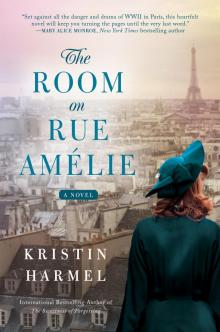 The Room on Rue Amélie
The Room on Rue Amélie The Winemaker's Wife
The Winemaker's Wife The Forest of Vanishing Stars
The Forest of Vanishing Stars The Book of Lost Names
The Book of Lost Names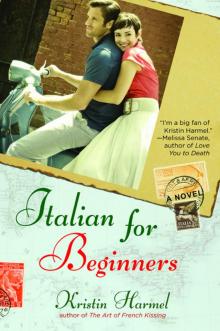 Italian for Beginners
Italian for Beginners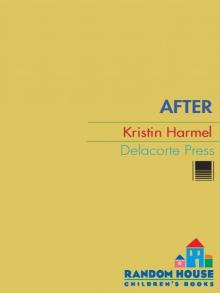 After
After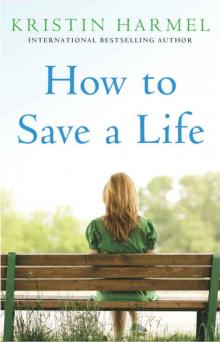 How to Save a Life
How to Save a Life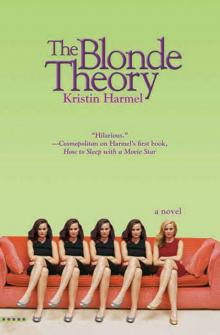 The Blonde Theory
The Blonde Theory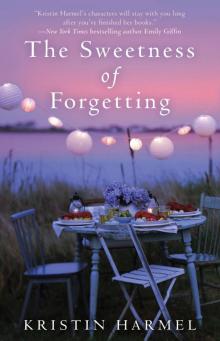 The Sweetness of Forgetting
The Sweetness of Forgetting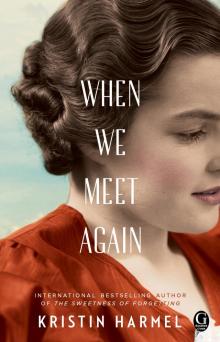 When We Meet Again
When We Meet Again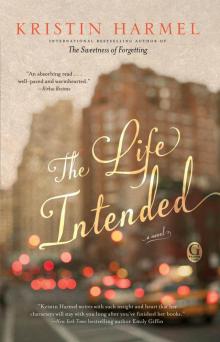 Life Intended (9781476754178)
Life Intended (9781476754178)